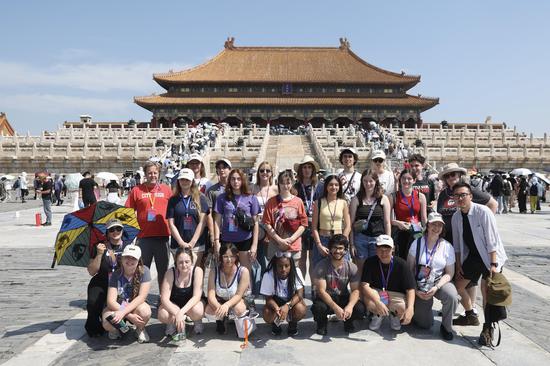China is stepping up efforts to promote high-quality employment by developing new growth engines in sectors such as artificial intelligence, modern manufacturing and electronics.
On May 27, the Political Bureau of the Communist Party of China Central Committee held its 14th group study session, of which the topic was promoting high-quality and sufficient employment.
Xi Jinping, general secretary of the CPC Central Committee, who presided over the study session, said that employment forms the basis of people's livelihoods and it is imperative to make high-quality and sufficient employment a priority goal of social and economic development.
He called for greater efforts to develop modern human resources characterized by high quality, sufficient quantity, optimized structure and rational distribution, in order to ease the structural imbalance between supply and demand in the job market.
With about 11.79 million students expected to graduate from college this year, Xi urged continuous efforts to prioritize the employment of young people and develop more job opportunities to fully harness their skills.
China's job market has been stable in recent years, with the unemployment rate staying within a reasonable range. A total of 12.44 million new urban jobs were created last year and another 3.03 million were created in the first three months of this year, according to the Ministry of Human Resources and Social Security.
The development of new growth engines in sectors such as high-tech, the green economy and the "silver economy" are also creating more job opportunities.
Figures cited by recruitment portal Zhaopin show that in 2023, job openings related to new energy vehicle businesses increased 32 percent year-on-year. The average salary for automotive software development positions rose 18 percent year-on-year in 2023, while professionals with a master's or doctorate degree were paid an average monthly salary exceeding 25,000 yuan ($3,450), data from the portal showed.
There is also great demand for computing talent in the job market, allowing for the rapid development and application of AI technologies, according to Zhaopin. For example, in the first quarter of this year, job openings for natural language processing engineers surged 126 percent year-on-year, with the monthly salary for the position reaching 24,535 yuan, up 12 percent year-on-year.
Pang Shi, director of the Chinese Academy of Personnel Science's department of employment and entrepreneurship, said that some strategic new industries are key to the growth of new quality productive forces, the emergence and development of which will not only inject fresh impetus into society and the economy, but also generate more job opportunities.
The demand for top-notch and versatile talent is growing in emerging industries such as AI, big data, new energy, modern manufacturing and biomedicine, Pang said, noting that such eligibility criteria will push job seekers to hone their skills and professionalism. "Their improving working knowledge and skills, in return, will enable them to secure higher pay," she added.
Experts and industry insiders cautioned that the job market will face pressures on the course of high-quality development.
Guo Sheng, CEO of Zhaopin, said the complicated geopolitical situation has increased difficulties in introducing top-notch talent from overseas, while the booming new quality productive forces have triggered a shortage of "core talent".
China's growing aging workforce could negatively impact industrial development and, in turn, the nation's economy, Guo warned.
Pang, from the academy, said that in order to secure high-quality employment, it is necessary for government authorities to strengthen support for private companies and small and medium-sized enterprises, which can play an important role in stabilizing the job market.
"Continuous efforts can be channeled to nurture new growth engines in the digital economy and silver economy sectors, which can generate high-quality job opportunities," she said, adding that it is also necessary to improve employment services for the public and release more supporting policies to promote the employment of young people.


















































 京公网安备 11010202009201号
京公网安备 11010202009201号